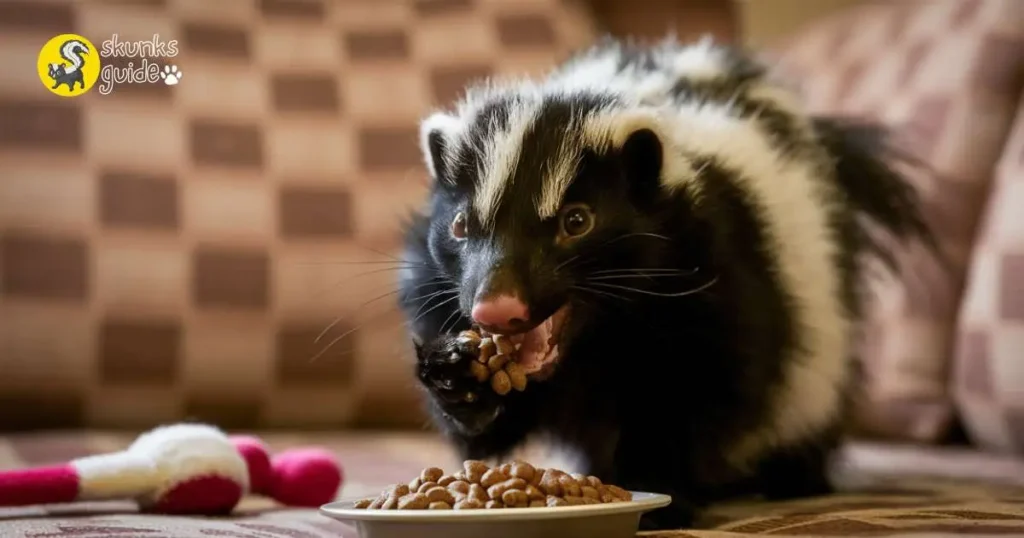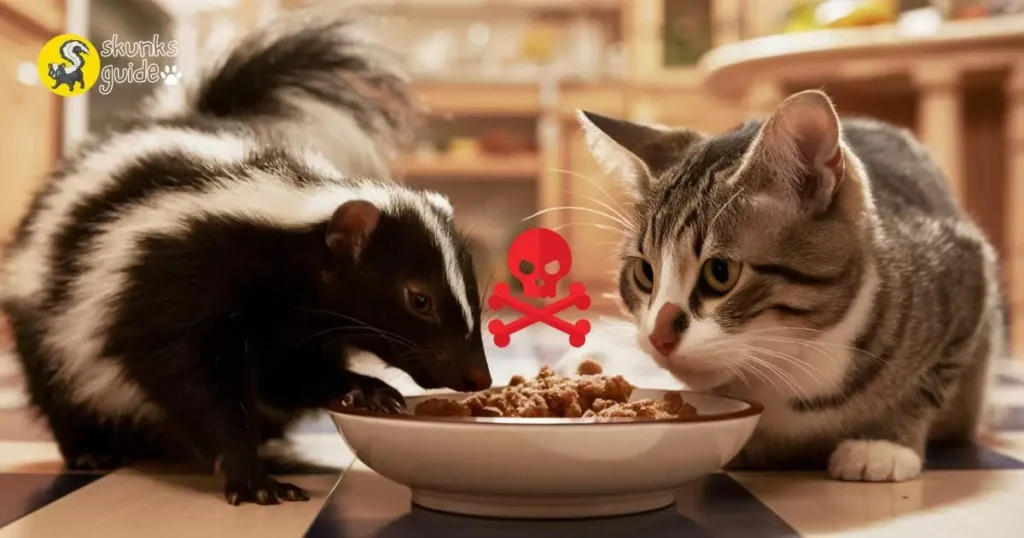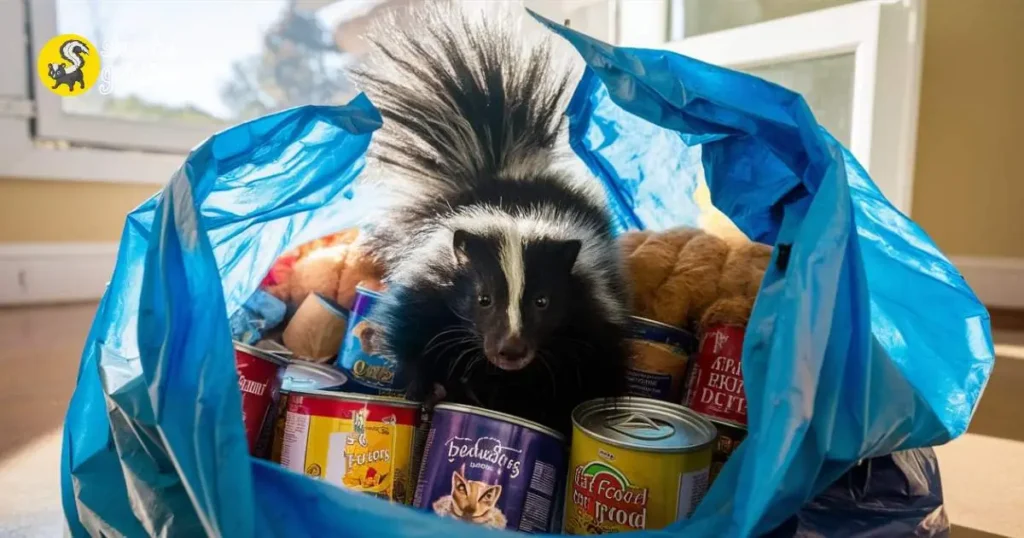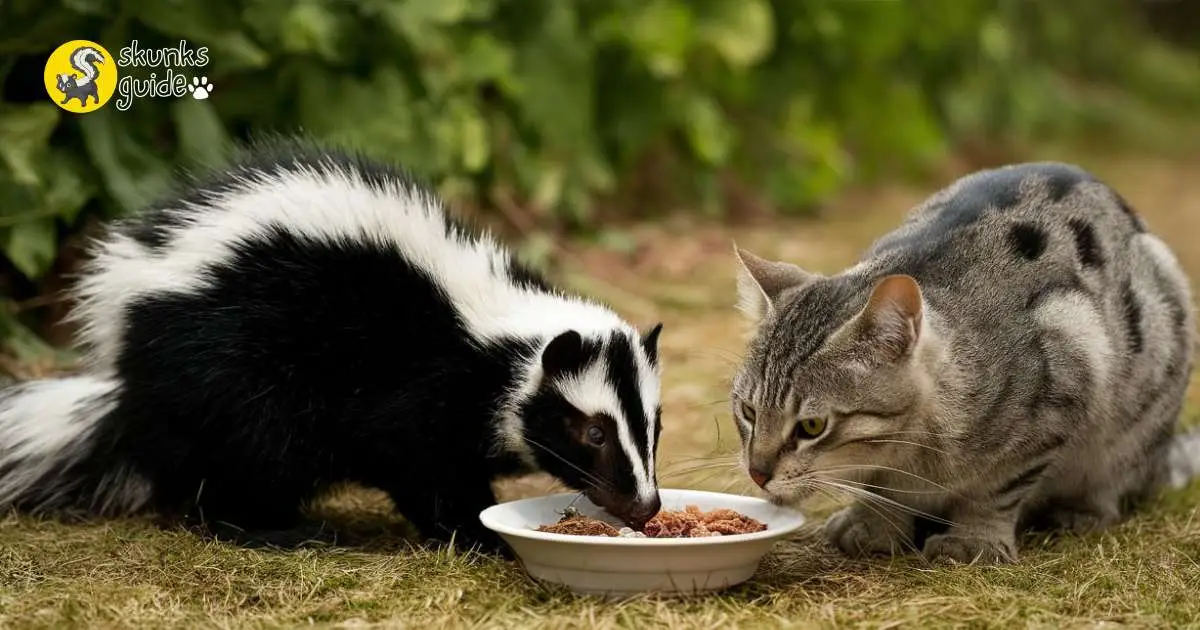Skunks and Cat Food: Safe or Not?
Last updated on June 13th, 2025 at 07:24 am
Yes, skunks do eat cat food. They are opportunistic feeders and will consume whatever food is available, including pet food.
Skunks are common visitors in many neighborhoods, especially at night. Their curious nature leads them to explore various food sources, including cat food left outside. This can be a concern for pet owners, as skunks can pose health risks to pets.
They are attracted to the smell and high protein content of cat food. Understanding skunk behavior helps in preventing unwanted visits. Keeping pet food indoors can reduce the chances of attracting these nocturnal creatures. With proper precautions, pet owners can protect their furry friends while coexisting with local wildlife. Knowing how to manage food waste can also deter skunks from invading your space.
Cat Food Temptations
Many pet owners wonder about skunks and their eating habits. One common question is, “Do skunks eat cat food?” The answer is yes. Skunks are often drawn to cat food. Understanding why can help keep your pets safe.

Why Skunks Are Attracted To Cat Food
Skunks are opportunistic feeders. They look for easy meals. Cat food is high in protein and fat, making it appealing. Here are some reasons skunks love cat food:
- Strong Smell: Cat food has a strong aroma that attracts skunks.
- High Protein: Skunks need protein for energy and growth.
- Easy Access: Cat food is often left outdoors or in open bowls.
Nutritional Value For Skunks
Cat food provides various nutrients. Skunks benefit from these nutrients. Here’s a quick overview of the nutritional value:
| Nutrient | Importance for Skunks |
|---|---|
| Protein | Essential for muscle growth and energy. |
| Fat | Provides energy and supports skin health. |
| Vitamins | Boosts immune function and overall health. |
| Minerals | Supports bone health and metabolic functions. |
Cat food can meet some of their dietary needs. However, it should not be a primary food source. Feeding skunks can lead to unwanted visits. Always secure your pet food to prevent attracting wildlife.
Risks Of Feeding Skunks Cat Food
Feeding skunks cat food can lead to several risks. Understanding these dangers is essential for wildlife lovers. Skunks may seem harmless, but they can face serious health issues. This section explores the health implications and dependency concerns related to cat food.

Health Implications
Cat food is not designed for skunks. It contains high protein and fat levels. These nutrients can cause health problems for skunks.
- Obesity: Excessive fat leads to weight gain.
- Digestive Issues: Skunks may struggle to digest cat food.
- Vitamin Deficiencies: A lack of essential vitamins can occur.
The table below highlights the common health risks:
| Health Risk | Description |
|---|---|
| Obesity | Weight gain due to high-fat content. |
| Diabetes | High sugar levels can lead to diabetes. |
| Kidney Problems | Excessive protein can harm kidneys. |
Dependency Issues
Feeding skunks regularly can create dependency. Skunks may rely on cat food instead of foraging.
- Loss of natural hunting skills.
- Reduced ability to find wild food.
- Increased visits to human homes.
These dependency issues can disrupt the local ecosystem. Wildlife needs a balanced diet from their natural surroundings. Feeding skunks can lead to more frequent conflicts with humans.
Preventing Skunks From Eating Cat Food
Skunks can become frequent visitors if they find cat food. Keeping skunks away is essential for your pets’ safety. Here are effective strategies to stop skunks from raiding your cat’s food.

Secure Feeding Stations
Creating a secure feeding area helps protect cat food. Follow these steps for an effective feeding station:
- Elevate the Food: Use a raised platform. Skunks can’t reach food easily.
- Timed Feedings: Feed your cat at specific times. Remove food after meals.
- Use Heavy Bowls: Choose bowls that are hard to tip over.
- Install a Gate: Secure the area with a gate. Prevent skunks from entering.
These methods will help keep your cat’s food safe. Regularly check the feeding area for any signs of skunks.
Alternative Skunk Deterrents
Using natural deterrents can effectively keep skunks away. Try these options:
- Citrus Peels: Place orange or lemon peels around the area.
- Vinegar: Spray vinegar near feeding stations. Skunks dislike the smell.
- Motion-Activated Sprinklers: Install these to startle skunks.
- Commercial Repellents: Use products designed to deter skunks.
Combining these methods increases their effectiveness. Ensure your cat’s feeding area remains skunk-free.
The Impact On Domestic Pets
Skunks may seem harmless, but they can impact your pets. Sharing food with wildlife can lead to various issues. Understanding these risks helps keep your pets safe.
Sharing Food With Wildlife
Feeding pets outdoors invites unwanted visitors. Skunks are opportunistic eaters. They enjoy cat food, making your yard attractive to them.
- Skunks are nocturnal and often visit at night.
- They are drawn to the smell of cat food.
- Leftover food can attract more wildlife.
Sharing food can create a habit. This habit can lead to frequent visits from skunks and other animals. Your pets may feel threatened or stressed by these encounters.
Wildlife And Human Habitats
Wildlife often ventures into urban areas. They search for food and shelter. Skunks are no exception. They may find cat food appealing.
This behavior raises important questions about human-wildlife interactions.
The Lure Of Urban Areas
Urban settings attract many animals. They offer easy access to food. Skunks are opportunistic feeders. They will eat almost anything.
Common food sources include:
- Pet food
- Garbage
- Bird seed
- Fruits and vegetables
Skunks are particularly drawn to cat food. It is high in protein and fat. This makes it very appealing.
Pet owners may inadvertently attract skunks by leaving food outside.
Consequences Of Wildlife Feeding
Feeding wildlife can lead to several problems. Some of these include:
- Increased human-wildlife conflicts
- Dependency on human food sources
- Spread of disease among animals
- Changes in natural behavior
Skunks that rely on cat food may lose their natural hunting skills. This can lead to more skunks in neighborhoods.
It can also cause them to become a nuisance. Pet food should be kept indoors to avoid attracting skunks.
Proper waste disposal is vital in urban areas.
Alternatives To Cat Food For Skunks
Skunks have unique dietary needs. While cat food can provide some nutrition, it may not be the best option. Choosing alternatives ensures your skunk stays healthy and happy. Let’s explore some suitable options.
Creating A Natural Diet In Captivity
Skunks thrive on a natural diet. This diet mimics what they would eat in the wild. Here are some food options:
- Fruits: Berries, bananas, and apples are great choices.
- Vegetables: Carrots, peas, and leafy greens provide essential nutrients.
- Proteins: Cooked chicken, turkey, or eggs are excellent protein sources.
- Insects: Mealworms and crickets are high in protein.
Mixing these foods offers variety. Always introduce new foods slowly. Monitor for any adverse reactions.
Supporting Skunk Rehabilitation
Skunk rehabilitation requires special care. Providing the right diet is crucial for recovery. Here’s a simple table of recommended foods:
| Food Type | Recommended Options |
|---|---|
| Fruits | Blueberries, Strawberries, Mango |
| Vegetables | Broccoli, Sweet Potatoes, Zucchini |
| Proteins | Fish, Lean Beef, Chicken Liver |
| Insects | Waxworms, Grasshoppers, Ants |
These foods help skunks regain strength. Always consult a vet for tailored advice. Proper nutrition aids in their rehabilitation journey.
Frequently Asked Questions
What Happens If Skunks Eat Cat Food?
Skunks may eat cat food if it’s accessible. This can lead to nutritional imbalances, as cat food lacks essential nutrients for skunks. Skunks can also become dependent on human food sources, potentially causing conflicts. It’s best to secure pet food to avoid attracting skunks to your yard.
How To Keep Skunks From Eating Cat Food?
To keep skunks from eating cat food, feed your cat indoors. Store food in sealed containers. Use motion-activated lights or sprinklers to deter skunks. Clean up any spilled food immediately. Consider feeding your cat at specific times to avoid attracting skunks at night.
What Food Is Poisonous To Skunks?
Foods poisonous to skunks include chocolate, garlic, onions, avocados, and caffeine. These items can cause serious health issues. Always keep harmful foods away from skunks to ensure their safety. Providing a balanced diet of fruits, vegetables, and insects is best for their well-being.
Conclusion
Skunks are opportunistic feeders and will eat cat food if it’s available. This can lead to unexpected visitors in your yard. To prevent skunks from raiding your pet’s food, store it indoors and clean up any spills. Understanding skunk behavior can help protect your pets and keep your outdoor space safe.

